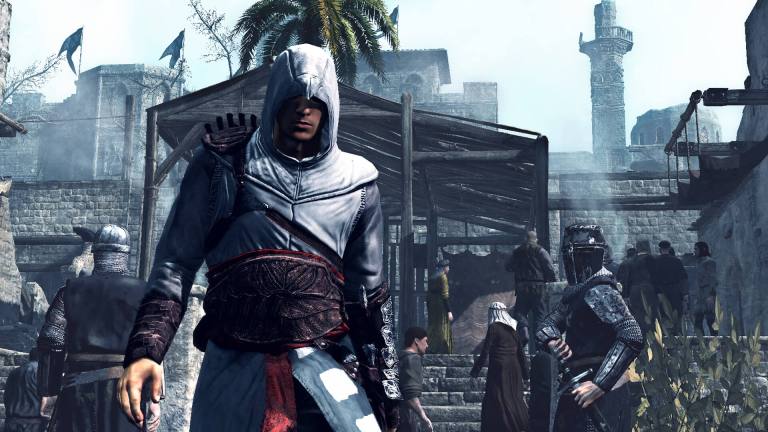Assassin’s Creed: What the Netflix Series Can Learn From Castlevania and The Witcher
Two of Netflix's better adaptations show how the Assassin's Creed series can live up to expectations.

Netflix recently announced its partnership with Ubisoft to develop multiple series based on the Assassin’s Creed franchise. The scope of this deal could eventually include both live-action and animated series, but the partnership will start with the production of a live-action adaptation of the best-selling games.
While there aren’t many official details available at this time regarding what parts of the Assassin’s Creed franchise these shows will cover, expectations are unusually high for these projects. Why? Well, Netflix happens to have produced two of the more notable adaptations with video game ties in recent memory: Castlevania and The Witcher, which was actually based on the books but came on the heels of the games’ success and borrowed elements from the CD Projekt Red titles.
With that in mind, let’s take a look at a few of the most important lessons that the Assassin’s Creed Netflix adaptations can learn from the success that Castlevania and The Witcher have enjoyed thus far.
Assassin’s Creed Shouldn’t Take Things So Seriously
There’s this weird thing that happens with some video game adaptations we’ll call the “respect reach.” Maybe it’s because there’s still this lingering perception that video games aren’t respected by wide audiences, but many video game adaptations just take things too seriously.
One of the first things that jumped out to me about Netflix’s Castlevania is the way that the show quickly established its sense of humor. Even The Witcher’s moments of levity lead to some of its best scenes. By keeping things light when possible, those shows managed to entertain their audiences first while setting up the next dramatic reveal.
There’s a sense of humor in the best Assassin’s Creed games that this upcoming adaptation could very well use to distinguish itself from the Assassin’s Creed movie (and other, lesser adaptations out there) so long as the showrunners aren’t too concerned with needing to be taken seriously.
Assassin’s Creed Shouldn’t Be Afraid of More “Mature” Content
The Assassin’s Creed series typically earns a “Mature” rating from the ESRB, but the game aren’t necessarily known for their violence and sexually explicit content. The rating is more of a technicality necessitated by the nature of the game’s assassination mechanics and bloody combat.
For what it’s worth, Castlevania and The Witcher both feature more “mature” content such as language, violence, and even nudity. Those elements don’t inherently make a show good (just as the lack of them doesn’t make a show bad), but it’s interesting that the two adaptations share this quality.
Maybe the lesson is that Assassin’s Creed needs to be willing to incorporate that kind of content if it all helps the pacing, storytelling, characters, or other key production elements. This kind of goes hand in hand with keeping things light, as Assassin’s Creed needs to make sure it has the creative freedom needed to ensure its most dramatic moments land as intended.
Assassins’ Creed Needs to Keep Things Simple (At First)
Part of the reason that the first season of Castlevania worked as well as it did was that it offered a relatively short (four episodes) setup of bigger things to come. Conversely, some of The Witcher’s stumbles can be attributed to its complicated multiple timeline structure that often struggled to cleanly introduce a large cast of characters and effectively establish its world’s mythology.
There’s a value to keeping things simple that feels especially relevant to the Assassin’s Creed series. The Assassin’s Creed games feature a complicated mythology that even some people who’ve played every game in the franchise struggle to keep up with, especially when you bring in the present-day sci-fi lore that serves as a gateway to the historical stuff.
Those complicated mythology story beats will come in time, but when Assassin’s Creed debuts, it should focus on its characters, world, and style before trying to dive deeper.
Assassin’s Creed Shouldn’t be Too Worried About Sticking to the Games’ Stories
Speaking of the Assassin’s Creed stories, there’s a strong argument to be made that the upcoming Netflix series shouldn’t be too concerned with sticking close to them.
Not only do the Assassin’s Creed games sometimes get bogged down in the series’ mythology, but they span hundreds of years and incorporate hundreds of characters. One of the great things about the newer games is that they get the chance to do their own thing (to a certain degree) beyond the present-day Desmond Miles story established in the first few games.
As we saw in Castlevania, it’s sometimes valuable for writers to take what they need from a series while ultimately using those aspects as the basis for a tale of their own design. In fact, we wouldn’t even mind if every Assassin’s Creed season told an anthology story set during a different era, unrestricted from a convoluted frame story about the end of the world.
Assassin’s Creed Needs to Feel Like a Big Production
One of the things that immediately separated The Witcher from both other Netflix series and other video game adaptations is the investment that Netflix made in its production quality. Netflix has invested big money in its series before, but The Witcher showed every dollar spent in the quality of its production rather than on the actors and directors attached to it.
It’s hard to imagine how Assassin’s Creed will succeed if it doesn’t walk a similar path. Most of the Assassin’s Creed games benefit from larger budgets that typically go towards crafting a visually stunning recreation of a certain time period. If Netflix’s Assassin’s Creed tries to save a few dollars in the wrong places, it’s immediately going to look like the half-hearted effort some fans fear it could ultimately be.
A big budget doesn’t guarantee that Netflix’s Assassin’s Creed will be a quality show. However, a big budget does afford the showrunners the space they need to figure out how this adaptation is going to fit into a rapidly evolving media landscape that’s certainly not lacking in competition.


